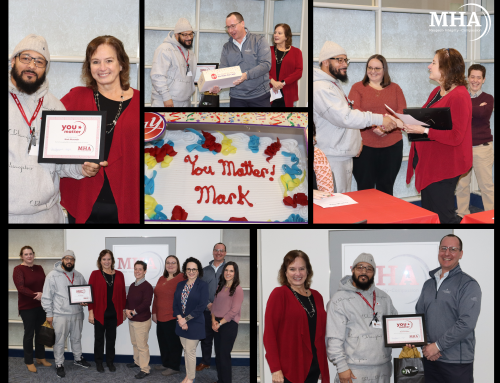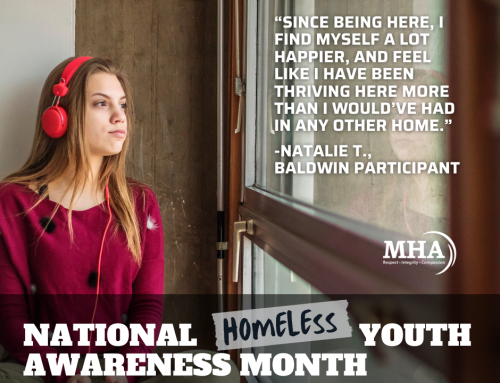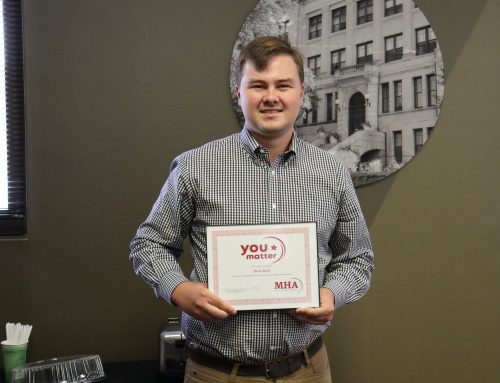“Sharon” was trained as an attorney. Working in probate court, she sought guardianship for patients, often representing parents or the Department of Mental Health. Her work representing patients at Northampton State Hospital gave her a different perspective. After winning a case that enabled a patient to leave the hospital, both the judge and the parents were concerned the patient would not seek appropriate shelter.
“The judge asked me to drive the patient to the Veterans Administration Hospital,” Sharon recalled. “I did, and I gave the man my card and said, ‘I hope you will get in touch with me for help with housing.’ As I left, I saw he was heading out to a field that wasn’t leading to the VA. His parents had begged, ‘Don’t let him leave the hospital,’ but if he is deemed competent he can leave. It’s that old revolving door. Right then I decided I wanted to do things a different way. I wanted to help people with mental illness. Representing mental health patients drove me to become a social worker.”
After completing her master’s in social work, Sharon pursued her calling. Coincidently, she also would find herself the mother of a daughter with serious mental health challenges. “I believe “Jeanne” first presented with signs of mental illness when she was born and had trouble nursing,” Sharon said. “She was first diagnosed after being hospitalized at a mental health facility, following summer camp. She was 15 at the time and appeared to be suffering from depression.”
Over the years, Jeanne has had periods of relative calm, but Sharon never knew when that could change. “Jeanne loves Boston and one year I took her there to celebrate her birthday,” Sharon said. “We checked into the hotel and when we walked into the room, which was pretty high up in the hotel, I saw there was a screen door to a balcony. I knew I had to get that door closed and at that moment Jeanne had an episode. She started to trash the place and I had to get the hotel staff to call 911 because I wasn’t in a position to do it. All of that happened in an instant and you couldn’t see it coming.”
Jeanne is now 51 and her life has included many examples of violence and risk taking. “She would run away onto the street in bare feet from whatever apartment she was in and the police would be called and she’d be taken in,” said Sharon. “It’s actually amazing that she’s still alive.”
The path forward is not always clear for someone who is mentally ill and acting out at home. Luckily Sharon had an older brother who Jeanne lived with for about a year. “Her uncle lived out of town, had no children and was self-employed,” Sharon said. “She had medication. She learned how to drive and cook. She had a structured, stable life with her uncle.”
In spite of this supportive environment, Jeanne had a psychotic break and attempted suicide. She went to a mental hospital near where her uncle lived. Her brother realized that Jeanne needed more than he could manage. Jeanne eventually chose an open mental health hospital. “This made it easier for our family,” Sharon explained, “because we could visit Jeanne and enjoy her without worrying about monitoring her. She could leave when she wanted and got to a less restrictive environment little by little. Eventually she lived on her own and had a job. She was doing really well.”
Tragically, personnel issues created chaos at the hospital and Jeanne’s therapy suffered. “The hospital was dealing with its own crisis and they were not fully available to families of patients,” said Sharon. “It forced a change and Jeanne had to move to a different part of the state. Her life has been a process of going to hospitals and getting help but never being able to sustain recovery. And as her mother, I’ve always taken the lead to get her care.”
In searching for support for her daughter, Sharon connected with MHA. “It took work and compromise, but over a period of 20 years things were mostly manageable with MHA’s help,” she said. “But then last year there was a change in the way the state runs the program that had been providing Jeanne’s care. Suddenly she had to move from MHA to another provider. It was heartbreaking having to start from scratch and there was not much support as the new agency was finding their way with a new caseload. Jeanne had no psychiatrist or nurse practitioner assigned to her and her medication wasn’t the same as before. I found myself going back and forth from New York City, where I live, trying to support Jeanne at meetings with the agency, reacting to people who were not getting the medications right and not responding to the issue. The result is that Jeanne lost a lot of ground this year.”
Despite all the challenges, Sharon counts herself fortunate due to the foresight and generosity of an ancestor. “My great-grandfather knew about mental illness,” she says. “He had two sisters with mental illness. He also knew about poverty because his father was an immigrant who came to America with nothing. My great-grandfather was successful, saved his money and had the vision to set up a trust fund for the health, education and welfare of the beneficiaries. So I have resources to help with Jeanne—not because I’ve made a lot, but because a relative had the assets and the kindness to set this up. I hired a private agency to provide 24/7 care for Jeanne, and as she gets used to them they’ll look for an apartment with live-in shifts around the clock. If you have Medicaid, you get some basic level of support covered, but if you’re in the middle—if you’re a hard working parent or sibling or relative of someone living with mental illness—you’re not going to get financial support for your ill relative, and you need to figure that out. The wear and tear is relentless for the person who is suffering and for the family. This is all happening in an ageing society. It’s frightening.”
Given her decades of life experience with mental health, what is Sharon’s outlook, from a mother’s perspective? “The magic of a family creates an amazing way to learn about your own humanity,” she said. “It wasn’t worth my daughter being ill for me to learn that, but it taught me how to be respectful and be attuned to not letting someone who is suffering continue to feel badly. If someone has a different illness, like cancer, you have a lot of natural supports available to you as a family member, often tied to a hospital or the community. But if someone has mental illness, there’s a lot of shame about it and those natural supports just aren’t the same. I want people in positions to affect change to find ways to improve the structure of care for people with mental illness. We should not pretend that families can manage all of this on their own. It’s not enough to just love them.”





